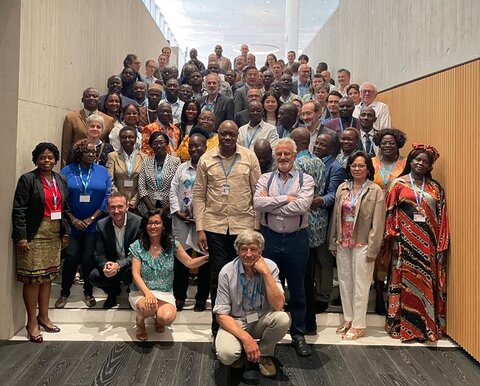LSTM team attend WHO stakeholders meeting on HAT elimination

LSTM representation at the Fifth WHO stakeholders meeting on human African trypanosomiasis (HAT) elimination in Geneva on 7-9 June 2023.
After several years of virtual meetings, in June the international human African trypanosomiasis community once again met in person for a joint meeting on Gambian (gHAT) and Rhodesian HAT (rHAT). The meeting was joined by over 140 participants from 36 countries, including WHO and ministry of health officials, research foundations, drug manufacturers, donors, non-governmental organizations, UN and multilateral institutions, and academia.
For LSTM, Iñaki Tirados, Karina Mondragon-Shem, Andrew Hope and Sophie Dunkley were invited to attend. The meeting aimed to strengthen networks for collaborations and coordination of the different stakeholders, review progress in elimination of HAT as a public health problem, identify challenges and opportunities in diagnostics, treatments, epidemiology, vector control, and to discuss the 2030 road map.
Following the welcome addresses by WHO representatives, National Sleeping Sickness Control Programmes touched on the major achievements of disease control programmes and gHAT elimination successes in Equatorial Guinea, Benin, Côte d’Ivoire, Togo, and Uganda where LSTM is directly involved in supporting vector control efforts under the Trypa-NO! partnership. The WHO announced the successful accomplishment of global 2020 targets: fewer than 2,000 cases reported annually and a 90% reduction in areas at risk compared to the year 2000. The new targets set out in the 2030 roadmap are zero new cases reported for gHAT, and elimination as a public health problem for rHAT.
LSTM members presented advances in tsetse control for rHAT in Malawi and Tanzania, and for gHAT in Uganda, South Sudan, Angola, and the Democratic Republic of the Congo. During open floor statements from institutions and academia, the historical and ongoing commitment of LSTM in the fight against African trypanosomiasis was highlighted.
Human African trypanosomiasis remains a neglected disease with significant implications for public health and socio-economic development. HAT primarily affects populations with limited access to healthcare and resources, posing a direct threat to human lives in addition to hampering agricultural productivity and economic growth.
The fifth stakeholder meeting the WHO concluded with calls to continue partnerships and engagement towards HAT elimination. Support for Sleeping Sickness Control Programmes is now more crucial than ever, and failure to do so will threaten elimination targets in all endemic countries. Success is in sight, but efforts must be sustained.